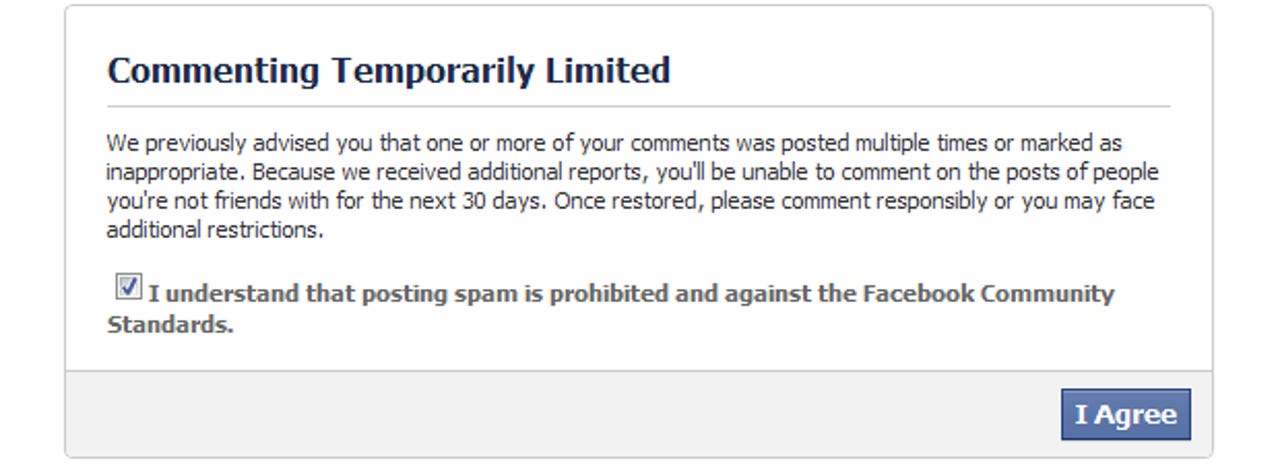Facebook extends censorship ban to a month

Update - Weeks later, Facebook stops censoring member
Over the weekend, I wrote an article titled "Facebook censors members after unjustly labeling them spammers" in which I described how Facebook user Rima Regas was being censored by the social network. The company put her on time out after apparently getting complaints about public posts she has made. Facebook then automatically labeled her a spammer.
She was told her punishment would last a week. After two weeks passed, she posted a status update complaining that she still couldn't comment. Worse yet, she didn't have a way to file a complaint or defend herself.
Even though a week had passed, when she tried to comment again she received this error:
Commenting Temporarily Suspended
As we notified you earlier, commenting on walls of users you are not friends with is temporarily suspended for you. Our systems noticed your comments were being marked as spam or posted multiple times.
That was on Saturday. On Monday, Regas got in touch with me again, explaining that she ran into an even bigger roadblock.
"Just tried to post a comment on a post by the Washington Post's Chris Cilliza and was logged out," Regas told me. "Upon logging in, I was taken to the following screen. After accepting, I was finally logged in and found that my comment was not posted. So, I guess I am now being punished for an additional 30 days? There are no start or end dates and, of course, there is no one to contact to find out."
Here's the new error message:
Commenting Temporarily Limited
We previously advised you that one or more of your comments was posted multiple times or marked as inappropriate. Because we received additional reports, you'll be unable to comment on the posts of people you're not friends with for the next 30 days. Once restored, please comment responsibliy or you may face additional restrictions.
As you can see in the screenshot above, agreeing to "I understand that posting spam is prohibited and against the Facebook Community Standards" is your only option. What isn't shown in the screenshot (as I've cropped it out) is that the only other buttons on the webpage are the Facebook logo (to go back to the homepage) and the Logout button.
This alone doesn't bother me since I believe this error should be very clear and users should be forced to agree not to spam. What does bother me is that if a Facebook user is unjustly labeled a spammer, he or she can't do anything.
Last weekend, technical evangelist Robert Scoble saw his comment blocked because Facebook deemed it "irrelevant or inappropriate". When I inquired about the issue, Facebook got back to me immediately saying the block was a false positive caused by an automatic spam filter.
In my last article, I also wrote:
Regas does not have Scoble's fame, so this problem might not blow up the same way, but I think her situation is much worse. It doesn't matter whether or not Facebook blames her case on a false positive again. This time, we're not talking about blocking a single comment. We're talking about temporary censorship for an unknown amount of time (remember, Regas was told the suspension would last one week, and it's already been two).
…
Users have been abusing reporting systems since they first appeared on the Internet, and likely even long before then. Off the top of my head, the best Facebook example for this is the brouhaha caused by the company banning users posting breastfeeding photos. Users who found mothers posting this content offensive would report them, rather than just unfriending them or ignoring them.
This is a very common practice, especially in political circles. If someone doesn't like you, or content you post, they report you for spam or some other reason, tell their friends to do the same, and the automatic systems take your content down, ban you, and so on. This is likely what happened to Regas.
…
The worrying trend here is that Facebook continues to add features like this without giving users an option to fight back. Whoever writes these error messages (the one Scoble got, the one Remas got, or the countless others that have yet to come to my attention) doesn't seem to realize they can be received unjustly, or if they do, they don't realize that users should be able to dispute them. There needs to be a due process.
When I contacted Facebook on Saturday, I didn't get an answer. This is very rare, especially when it comes to a controversial topic such as this one. I have once again contacted Facebook about this issue and will update you if I hear back.
Update - Weeks later, Facebook stops censoring member
See also:
